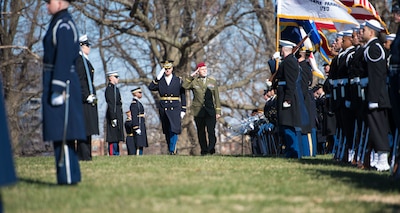By Terri Moon Cronk DoD News, Defense Media Activity
WASHINGTON, March 8, 2018 — U.S. Transportation Command
stands ready to deliver on behalf of the nation's objectives anywhere at any
time, Transcom’s commander told lawmakers on Capitol Hill today during a joint
convening of the House Armed Services Committee’s panels on readiness and
seapower and projection forces.
Yet, as Air Force Gen. Darren W. McDew noted he has
testified before, he remains concerned about the future.
“As we refocus our efforts on great power competition, we're
faced with adversaries who want to challenge our democratic values and
undermine our security and the existing balance of power,” McDew said. “In this
environment, the logistics enterprise must always be ready.”
The resources necessary to transport and sustain America's
military must keep pace, he said, and the Defense Department’s ability to
deploy a decisive force is foundational to the National Defense Strategy.
“The size and lethality of the force is of little
consequence if we can't get it where it needs to go when we want it there,”
McDew added.
The 2018 National Defense Authorization Act directed a
mobility-requirements study and found the existing inventory of mobility assets
is sufficient to support the requirements of combatant commanders, he said.
“This study will [also] consider the current strategic
context and use updated assumptions [such as] multidomain contested
environments [and] attrition of mobility assets, and the outcomes of the study
will provide valuable insight to ensure we are able to respond to tomorrow's
needs, as well,” the general added.
Weight Of Nation Needed
“But U.S. Transcom can’t get there alone,” McDew said. “We
need the weight of the nation with us and behind us to make sure that our
diplomats -- when they go to the negotiating table -- are negotiating from a
position of strength.”
The cyber domain is of great concern, he said. “Today our
adversaries don't have to stop us with bombs and bullets. All they have to do
is slow us down with ones and zeros. That's the challenge, I would say, of our
time,” he added.
“We have got to get smarter -- as an industry and as a
nation, not only about how we protect ourselves, but how we protect each
other,” McDew said. “Cyber defense is more than just security. It's about …
mission assurance. It's a national issue. From safeguarding our intellectual
property to guaranteeing the integrity of our elections, we've all got to be
together,”
And in addition to threats from the cyber domain, challenges
in the physical domain also exist, he said.
Personnel Concerns
“For the past three decades, reserve component assets have
been used to sustain day-to-day operational requirements, a function for which
they weren't properly resourced or structured,” the general said. “Meeting the
challenges of the future may require adjustments to the mobilization
authorities, or force mix to ensure we have access to vital capacity currently
resident in our reserve and guard,” he noted.
Transcom’s ability to move patients from the battlefield is
also facing challenges, he said, noting that although the command operates the
most robust patient movement system in the world, it lacks sufficient capacity
to surge for large-scale conflicts with mass casualties.
“The combination of insufficient personnel, equipment,
infrastructure and capacity for patient movement significantly decreases the
likelihood we'll see the same high-level survival rates [to which] we've all
become accustomed,” McDew testified. “We continue to work with the services,
the Joint Staff and the national health enterprise to address these
challenges.”
If the United States is able to maintain its go-to-war
capacity, “we must ask ourselves as a nation: Who are we and who do we want to
be?” he noted. “The U.S. flag fleet has steadily declined since World War II
from a little over 1,200 ships to 81 remaining today. That degradation
correlates to a decline in qualified merchant mariners. They are the backbone
of our industry. If we continue to lose this capacity, I'm concerned what it
will mean for how we project our force in the future.”








